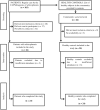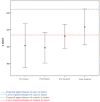Differential Physical and Mental Benefits of Physiotherapy Program Among Patients With Schizophrenia and Healthy Controls Suggesting Different Physical Characteristics and Needs
- PMID: 33633600
- PMCID: PMC7900508
- DOI: 10.3389/fpsyt.2021.536767
Differential Physical and Mental Benefits of Physiotherapy Program Among Patients With Schizophrenia and Healthy Controls Suggesting Different Physical Characteristics and Needs
Abstract
In contrast to several other severe illnesses marked by inflammation and autoimmunity that now have potent and efficient treatments and even cures, schizophrenia (SCZ) is a disease still associated with poor outcome, incapacity, and social burden. Even after decades of research on the brain and behavior, this illness is still associated with profound effects on both mental health and physical health, with recent studies showing that treatment is more efficient when associating drugs with psychological and physical treatments. Most of the studies measured the effects of physical intervention compared with usual care and demonstrated a positive effect as an add-on treatment. What remains unclear is the different effects of the same intervention in normal subjects in a sample of patients with the illness. The study aimed to evaluate the effects of physical intervention over motor functional capacity and mental health in patients with SCZ compared with healthy controls (HC). The outcomes were (a) functional capacity [by 6-min walk test (6MWT)], (b) body flexibility index (Wells' bench), (c) disease severity [by Brief Psychiatric Rating Scale (BPRS)], (d) quality of life [by 36-Item Short Form (SF-36) questionnaire], and (e) physical activity [Simple Physical Activity Questionnaire (SIMPAQ)]. The intervention was associated with significant decrease of body mass index (BMI), blood pressure, disease severity, and improvement in daily life activities. Unexpectedly, it was observed that schizophrenics, compared with matched HC, were at a lower level of performance in the beginning, remained below HC over the studied time despite similar physical intervention, and had different changes. The intervention had lower effects over physical capacity and better effects over quality of life and disease severity. The results confirm previous studies comparing patients receiving physical intervention but suggest that they may receive different types of intervention, suited for their different baseline fitness, motivation, and capacity to engage in physical effort over sustained time. Additionally, they point to extended time of intervention of multidisciplinary treatment (physical and psychological-cognitive techniques) to improve outcomes in SCZ.
Keywords: 6-min walk test; exercise; functional capacity; physical activity; schizophrenia.
Copyright © 2021 Szortyka, Batista Cristiano and Belmonte-de-Abreu.
Conflict of interest statement
The authors declare that the research was conducted in the absence of any commercial or financial relationships that could be construed as a potential conflict of interest.
Figures



References
-
- World Health Organization, 2008 The Global Burden of Disease. Geneva: World Health Organization; (2004).
-
- World Health Organization Mental Health. World Health Organization. World Health Organization Home; (2019). http://www.who.int/mental_health/management/schizophrenia/en/4 (accessed February 08, 2020).
-
- American Psychiatric Association Diagnostic and Statistical Manual of Mental Disorders, Fourth Edition (DSM-IV). Washington, DC: American Psychiatric Organisation; (1994).
LinkOut - more resources
Full Text Sources
Other Literature Sources

